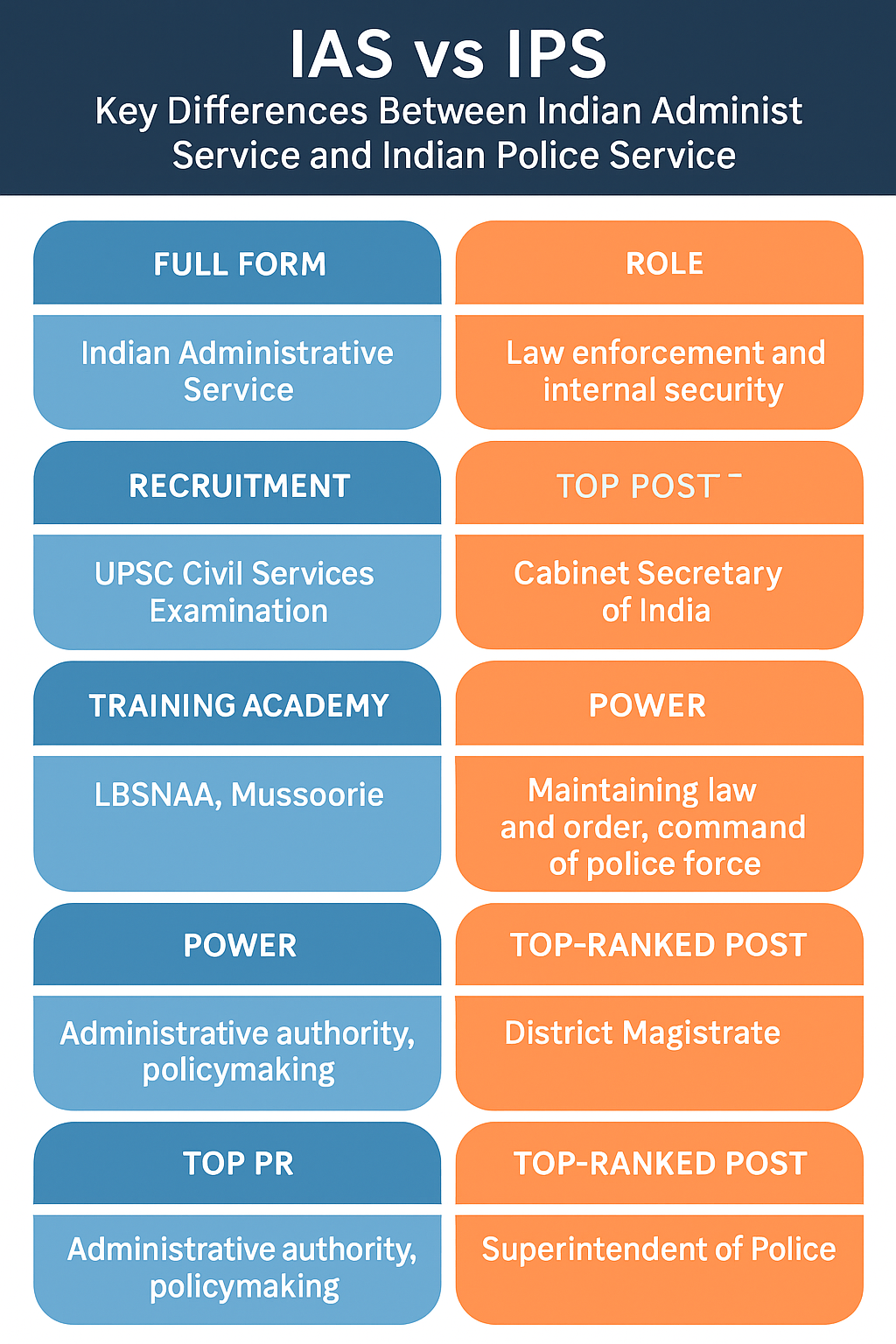
IAS vs IPS – Difference Between IAS and IPS, Who is More Powerful?
Introduction
Among the many prestigious positions in Indian civil services, two names often dominate the conversation – IAS (Indian Administrative Service) and IPS (Indian Police Service). Both are elite services recruited through the UPSC Civil Services Examination, and both offer powerful roles with immense responsibility. But which one is more powerful? What are the key differences in responsibilities, authority, lifestyle, and career path?
In this comprehensive article, we compare IAS and IPS officers in detail to help UPSC aspirants and general readers understand the distinction and determine which career path aligns better with their interests and goals.
IAS vs IPS – Overview
| Criteria | IAS (Indian Administrative Service) | IPS (Indian Police Service) |
|---|---|---|
| Full Form | Indian Administrative Service | Indian Police Service |
| Recruitment Exam | UPSC Civil Services Examination | UPSC Civil Services Examination |
| Cadre Controlling Ministry | Ministry of Personnel, Public Grievances and Pensions | Ministry of Home Affairs |
| Primary Role | Administrative Governance and Policy Implementation | Law Enforcement and Internal Security |
| Top Designation | Cabinet Secretary of India | Director General of Police (DGP) |
| Training Academy | LBSNAA, Mussoorie | Sardar Vallabhbhai Patel National Police Academy, Hyderabad |
Roles and Responsibilities
IAS Officer
IPS Officer
- Maintains public order and security.
- Leads police departments at the district, state, and central levels.
- Investigates crimes and leads operations against criminal organizations.
- Commands paramilitary forces and special agencies (CBI, RAW, IB, etc.).
- Implements law enforcement strategies and manages police personnel.
Training Duration and Curriculum
Both IAS and IPS officers begin their journey at LBSNAA (Lal Bahadur Shastri National Academy of Administration) for a common foundation course. Post this:
- IAS officers continue advanced administrative training at LBSNAA.
- IPS officers move to SVPNPA (Sardar Vallabhbhai Patel National Police Academy) in Hyderabad for intense police and combat training.
While IAS training focuses more on public administration, policy, and governance, IPS training includes weapons handling, physical endurance, criminology, investigation, and intelligence gathering.
Who is More Powerful – IAS or IPS?
what s salary of an IAS officer
Administrative Power
IAS officers hold positions such as District Magistrates, Secretaries to the Government, and Chief Secretaries of States. They have greater administrative control and are often at the top of the bureaucracy. They coordinate with all departments, including the police.
Law Enforcement Power
IPS officers have command over armed police, crime control, and intelligence. Their real-time power in maintaining law and order during emergencies is substantial.
Chain of Command
In a district, the District Collector (IAS) is considered the head of the civil administration, while the Superintendent of Police (IPS) heads the district police. The SP reports to the DM in law-and-order scenarios, placing IAS slightly above IPS in a hierarchy.
Conclusion on Power
While both are powerful in their domains, IAS officers are considered more powerful administratively and hierarchically. However, IPS officers wield considerable real-time executive power in policing and public safety. The definition of power varies based on context.
Salary and Perks – IAS vs IPS
| Rank | IAS Salary (Approx.) | IPS Salary (Approx.) |
|---|---|---|
| Junior Scale | ₹56,100 + TA, DA, HRA | ₹56,100 + TA, DA, HRA |
| Senior Time Scale | ₹67,700 – ₹2,08,700 | ₹67,700 – ₹2,08,700 |
| Super Time Scale | ₹1,18,500 – ₹2,14,100 | ₹1,18,500 – ₹2,14,100 |
| Apex Scale | ₹2,25,000 (Fixed) | ₹2,25,000 (Fixed) |
| Cabinet Secretary (IAS) | ₹2,50,000 | Not Applicable |
Besides salary, both services enjoy perks like government bungalows, official vehicles, security personnel, and post-retirement benefits. IPS officers may also receive gallantry medals and additional allowances in high-risk postings.
Career Growth and Promotions
IAS Promotion Timeline
- Assistant Collector (Training)
- Sub-Divisional Magistrate
- Additional District Magistrate
- District Magistrate/Collector
- Divisional Commissioner
- Principal Secretary
- Chief Secretary
- Cabinet Secretary (Top post)
IPS Promotion Timeline
- Assistant Superintendent of Police (ASP)
- Superintendent of Police (SP)
- Senior SP
- Deputy Inspector General (DIG)
- Inspector General (IG)
- Additional DGP
- Director General of Police (DGP)
- Director IB/CBI/NIA (Top post)
Postings and Transfers
IAS officers are posted in administrative departments, secretariats, ministries, and district-level positions. They can also be sent on central deputation to the PMO, Home Ministry, MEA, etc.
IPS officers are posted in police departments, paramilitary forces, investigation agencies (CBI, IB, NIA), and anti-terror units. Their postings often involve more physical mobility and risky fieldwork.
Which is Better – IAS or IPS?
This depends on your interest, temperament, and career goals:
- Choose IAS if you’re interested in governance, policymaking, administrative reforms, and leadership roles at the state/national level.
- Choose IPS if you have a passion for law enforcement, public order, criminology, and working in action-oriented roles.
Both are equally prestigious and serve critical roles in nation-building. One is not better than the other—they’re simply different tracks within the same mission.
Final Verdict – IAS vs IPS: Who is More Powerful?
In conclusion, the answer depends on the definition of power. If you’re talking about administrative authority, influence on policymaking, and hierarchy — the IAS officer is more powerful. If you’re referring to real-time enforcement, ground-level command, and public impact — the IPS officer stands tall.
Ultimately, both work in tandem to ensure smooth governance and law and order in the country. Both careers are prestigious, and what matters most is how sincerely and ethically you serve the nation.
About the Author: Tushar Kumar
An MBA Post graduate. In teaching industry since 9 years and has worked with google in advertising and Publishing. Worked with Airtel in sales. TaTa in Hospitality



